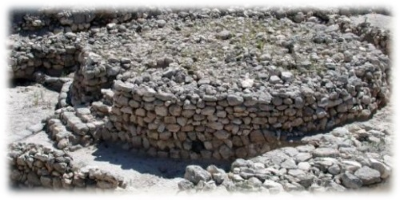The Hebrew language developed in a nomadic agricultural culture. Because of this, much of the language is centered around this lifestyle. The more we understand their way of life and culture, the more we can understand their language. This benefits us, as Bible students, because we can better understand the author's message if we better understand his language.
The Nomads
In Genesis 4:20 we read about the first Nomad Jabal, a descendent of Adam through Cain.
"And Adah bare Jabal: he was the father of such as dwell in tents, and of such as have cattle."
We know that Jabal and his descendants were nomads from the simple fact they lived in tents and raised livestock. A tent (ohel in Hebrew) is a portable shelter for the purpose of moving from one grazing place to another. The Hebrew word used in the above for cattle is miqneh which actually means any livestock property. This could be cattle, sheep, goats, donkeys, etc. When the livestock consumed the edible vegetation in one area, the herder would then pack up his tent and his belongings and move on to better grazing land.
Probably the most famous nomad is Abraham. He traveled a great deal through the land of the Near East living in tents and raising livestock.
The Tent
The tent is a very important part of the nomads life. By looking at the many words derived from this shelter we have tangible, hands on tools with which to teach our children the basic concepts in the Bible. In this study we will be looking at a tent stake. For those who have camped before, you are probably familiar with these stakes. What is the most important factor when placing your tent stakes? The ground. If you drive it in soft ground, any tension on the rope will pull the stake right out. You need very firm ground to hold the stake in. The ideal ground would require a hammer to beat the stake in. In ground like this the stake will remain secure in its position even in a strong wind. Let us now look at a passage of Scripture that uses this "concept".
Isaiah 22:23 "I will drive him like a peg into a firm place, he will be a seat of honor for the house of his father."
Here we have the stake (peg) being driven into a "firm" place. The Hebrew word translated as "firm" here is the verb אמן (aman, Strong's #539) which literally means "to be firm or sure". When setting up our tent, we desire to find a spot where the ground will be firm.
Believe
The verb aman is used 110 times in the Old Testament. Let us now look at another passage using this same verb and see what it says.
Genesis 15:6 "Abram believed the LORD, and he credited it to him as righteousness"
The word "believed" is the very same Hebrew verb aman. The picture we have from this is that Abram was firm in his devotion to God. Just as a stake planted in firm ground supports the tent, even in a storm, Abram will support God, even in the storms of life. The question we now ask is, how did Abram remain firm? The verse just before states;
Genesis 15:5,6 '[God] took [Abram] outside and said, "Look up at the heavens and count the stars--if indeed you can count them." Then he said to him, "So shall your offspring be." Abram believed the LORD, and He credited it to him as righteousness.'
We usually read this to mean that Abram believed God's promise in verse 5. The problem with this is that the Hebrew verb aman means more than just knowing something to be true. Why did God give this promise to Abram?
Genesis 26:4,5 "I will make your descendants as numerous as the stars in the sky and I will give them all these lands, and through your offspring all nations on earth will be blessed, because Abraham obeyed me and kept my requirements, my commands, my decrees and my laws (Torah in Hebrew)".
God made this promise to Abram because he was firm in his obedience to God. The Hebrew in Genesis 15:6 does not say Abram "believed" God, it says he was "firm" in God. From Genesis 26:5 we see that he was firm in his obedience to God and his Torah.

Like what you’re discovering? Continue the journey from Bible reader to translator.
|






